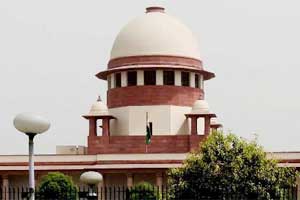Stay updated with the latest - Click here to follow us on Instagram
No conviction only on ground of tainted money: SC
The apex court also said it was necessary to prove that the accused voluntarily accepted the bribe.

A person cannot be convicted for corruption on mere recovery of the tainted money unless the charge is supported by substantive evidence,the Supreme Court has ruled,upholding the acquittal of a college professor.
The apex court also said it was necessary to prove that the accused voluntarily accepted the bribe for extending a favour or fulfilling an obligation.
monthly limit of free stories.
with an Express account.
Mere recovery of tainted money,divorced from the circumstances under which it is paid,is not sufficient to convict the accused when the substantive evidence in the case is not reliable.
The mere recovery by itself cannot prove the charge of the prosecution against the accused. In the absence of any evidence to prove payment of bribe or to show that the accused voluntarily accepted money knowing it to be bribe,conviction cannot be sustained, the bench said,quoting from its earlier judgements in the Girish Babu (2009)and Suraj Mal(1979) cases.
A bench of justices Asok Kumar Ganguly and Deepak Verma passed the judgement dismissing Kerala governments appeal challenging the High Courts acquittal of professor C P Rao.
The apex court said the high court had rightly acquitted the accused as the complainant was not examined by the prosecution and there was sufficient evidence to prove that the money was thrust upon him.
Apart from that,it is the case of the respondent that when CW 1 (complainant) met him in a hotel room,the respondent shouted that some currency notes had been thrust into his pocket by CW.
Such shouts of the respondent were heard by PW 1 and PW 2. The evidence of PW 1 and PW 2 were recorded by the trial court. The evidence of PW 1 and PW 2 could not be,in any way,shaken by manner of cross examination. PW 3 has also given evidence of the previous animosity between the college authorities and the respondent who had an occasion to file reports with the college authorities on the basis of some inspection, the apex court said.
The sessions court had earlier sentenced Rao to two years imprisonment under the Prevention of Corruption Act for allegedly accepting a bribe of Rs 5000 from the complainant on October 19,1994,for giving pass marks to certain candidates in all the subjects.
According to the prosecution,the accused professor had sought the bribe for awarding pass marks to all students who appeared in the practical examination of pharmaceutical-II in D-Pharma final examination in the year 1994.
It is an admitted case that the respondent alone cannot give such marks. In view of the examination system prevailing,such marks have to be approved by others. The respondent alone,therefore,is admittedly not in a position to allot higher marks, the bench said.
The bench agreed with the high courts reasoning that when there was no corroboration of the complainants testimony regarding the bribe demand,the allegation has to be discarded.